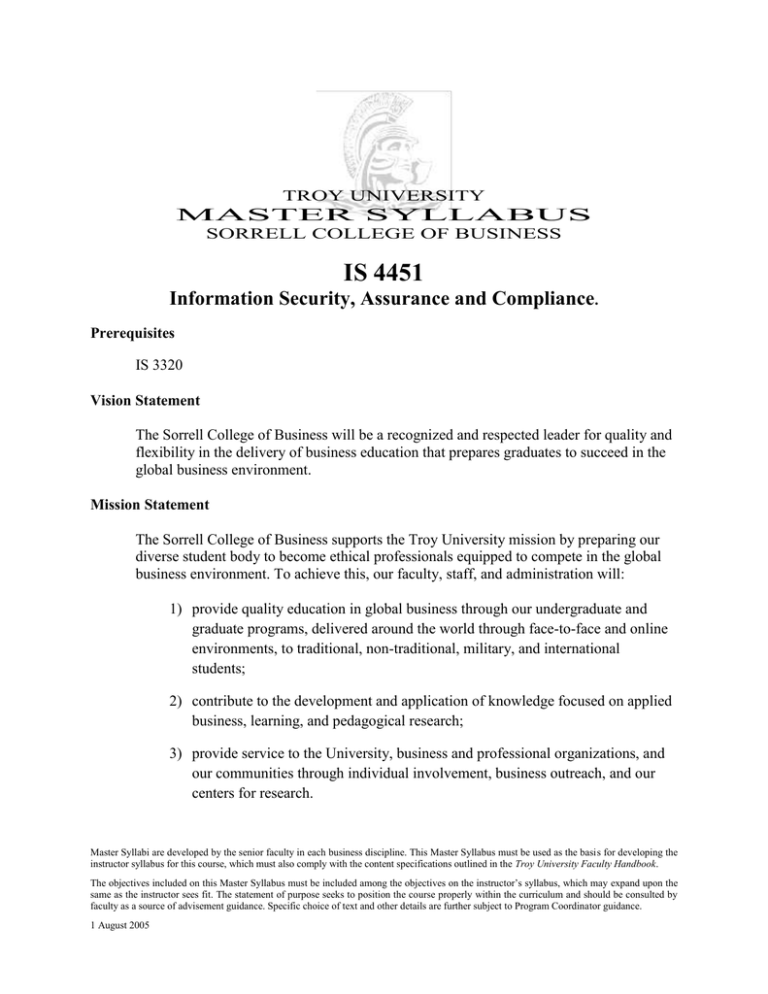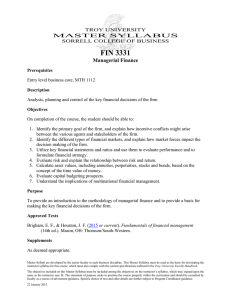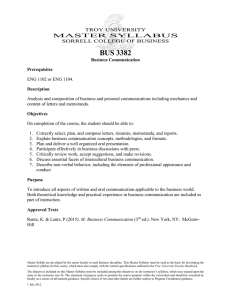
TROY UNIVERSITY
MASTER SYLLABUS
SORRELL COLLEGE OF BUSINESS
IS 4451
Information Security, Assurance and Compliance.
Prerequisites
IS 3320
Vision Statement
The Sorrell College of Business will be a recognized and respected leader for quality and
flexibility in the delivery of business education that prepares graduates to succeed in the
global business environment.
Mission Statement
The Sorrell College of Business supports the Troy University mission by preparing our
diverse student body to become ethical professionals equipped to compete in the global
business environment. To achieve this, our faculty, staff, and administration will:
1) provide quality education in global business through our undergraduate and
graduate programs, delivered around the world through face-to-face and online
environments, to traditional, non-traditional, military, and international
students;
2) contribute to the development and application of knowledge focused on applied
business, learning, and pedagogical research;
3) provide service to the University, business and professional organizations, and
our communities through individual involvement, business outreach, and our
centers for research.
Master Syllabi are developed by the senior faculty in each business discipline. This Master Syllabus must be used as the basis for developing the
instructor syllabus for this course, which must also comply with the content specifications outlined in the Troy University Faculty Handbook.
The objectives included on this Master Syllabus must be included among the objectives on the instructor’s syllabus, which may expand upon the
same as the instructor sees fit. The statement of purpose seeks to position the course properly within the curriculum and should be consulted by
faculty as a source of advisement guidance. Specific choice of text and other details are further subject to Program Coordinator guidance.
1 August 2005
Master Syllabus: IS 4451
2
Description
This course introduces information security awareness, governance, assurance, and
compliance associated with essential network infrastructure. Emphasis is placed on
understanding information systems security policy and technology countermeasures
across network infrastructure access points including physical security, authentication,
access control, encryption, and system management.
Objectives
On completion of the course, the student should be able to:
1.
2.
3.
4.
5.
6.
7.
8.
9.
10.
11.
12.
13.
Discuss the need for security.
Describe the application of symmetric and public key cryptography.
Install, configure, and manage Public Key certificate services.
Describe IP security issues and how the IPSec protocol addresses them.
Explain types of intrusions detection and prevention methods and systems.
Describe access control technologies.
Discuss physical control principles.
Develop and implement security policies.
Explain computer forensics.
Design and develop a disaster recovery plan.
Describe Risk Management concepts.
Discuss the legal and ethical issues of information security.
Explain approaches for maintaining information security.
Purpose
To recognize information and network infrastructure security as essential critical success
factors for information systems in a business environment, including how to plan,
implement, and manage security countermeasures. This course is an information systems
concentration elective within the global business major.
Approved Texts
Stallings & Brown (2012 or current). Computer Security: Principles and Practice,
Pearson/Prentice Hall.
Troy University Faculty Handbook (2010): Section 3.9.2.8 [extract] — essential elements of the syllabus (somewhat modified for space):
1. Course title
2. Course number +
section
3. Term
4. Instructor
5. Prerequisites
6. Office hours
7. Class days, times
8. Classroom
location
9. Office location +
e-mail address
10. Office telephone
11. Course
description,
objectives
12. Text(s)
13. Other materials
14. Grading methods, 16. General supports
criterion weights,
(computer works,
make-up policy,
writing center)
mid-term grade
17. Daily assignments,
reports
holidays, add/drop
15. Procedure, course
& open dates, dead
requirements
day, final exam
18. ADA statement
19. Electronic device
statement
20. Additional
services,
statements
21. Absence policy
22. Incomplete-work
policy
23. Cheating policy
24. Specialization
requirements
(certification,
licensure, teacher
competencies)
Master Syllabus: IS 4451
3
Whitman & Mattord (2011 or current). Management of Information Security (3rd ed.).
Cengage
Whitman & Mattord (2011 or current). Hands-On Information Security Lab Manual (3rd
ed.). Cengage
Palmer (2009 or current). Hands-On Microsoft® Windows® Server 2008 Administration
(1st ed.). Cengage.
Supplements
As deemed appropriate.
Troy University Faculty Handbook (2010): Section 3.9.2.8 [extract] — essential elements of the syllabus (somewhat modified for space):
1. Course title
2. Course number +
section
3. Term
4. Instructor
5. Prerequisites
6. Office hours
7. Class days, times
8. Classroom
location
9. Office location +
e-mail address
10. Office telephone
11. Course
description,
objectives
12. Text(s)
13. Other materials
14. Grading methods, 16. General supports
criterion weights,
(computer works,
make-up policy,
writing center)
mid-term grade
17. Daily assignments,
reports
holidays, add/drop
15. Procedure, course
& open dates, dead
requirements
day, final exam
18. ADA statement
19. Electronic device
statement
20. Additional
services,
statements
21. Absence policy
22. Incomplete-work
policy
23. Cheating policy
24. Specialization
requirements
(certification,
licensure, teacher
competencies)



